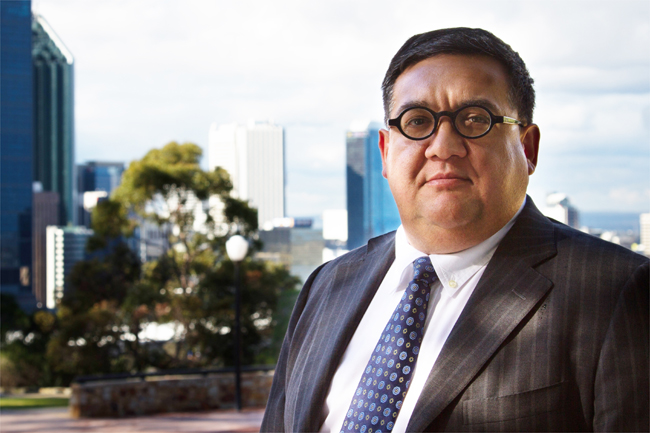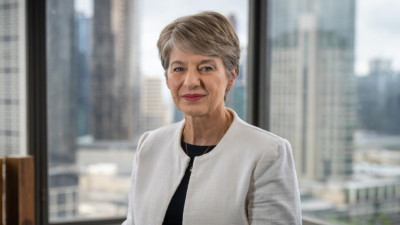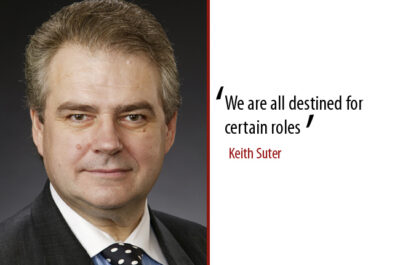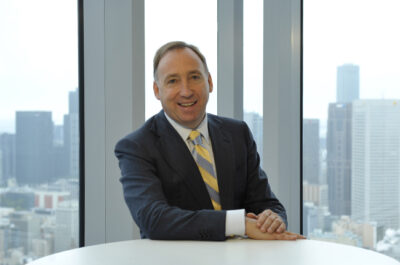Ideas and consequences: the decision trees of investing
Sam Sicilia… science meets investments
HOSTPLUS has a history of innovation. It has embarked on brave and unusual marketing campaigns. It brought its member services call centre in-house some years ago. It plans to form a PST next year which will be of interest to SMSFs and small funds as this will have an infrastructure option. Greg Bright talks to the CIO, SAM SICILIA, about innovation and his own investment philosophies.
Sam Sicilia thinks a lot about the future. Although spending the past 20 years in investments, his doctorate is in mathematical physics. He has a scientist’s brain and inquisitiveness.
“Life ultimately involves decision trees,” he says. “Although the branches may be qualitative or subjective. You have to think about consequences. There are ideas and there are consequences.”
The $14 billion national fund for the hospitality industry, which has more than one million members most of whom are under 30 years of age, holds annual investment forums across Australia for members which will usually have a theme. Last year it was about the European financial crisis, focusing on Greece. This year it is about infrastructure, an asset class which HOSTPLUS has been fond of.
“When we thought about the Greek crisis, we considered what would happen if even one country left the Eurozone,” he says. “My thesis was no-one would leave because the consequences of doing so were too dire. What would it mean for Germany when its currency, presumably a new Deutschmark, soars? Who wants a strong currency? My crystal ball was saying no-one would leave, in fact there are more countries in the Eurozone today not less – no-one has departed. There’s no upper limit on how much credit can be created or how much money can be printed. What really matters is whether these practices are localised or widespread – the consequences are very different in each case.”
So far, the call has been correct. But our crystal ball is saying the danger is not yet over.
Sicilia says that people sometimes make the mistake of thinking that large regional or global economies will behave in a similar fashion to local economies.
“We questioned that. We thought the consequences of countries in Europe defaulting on local debt would be different to when a single country, like Argentina, defaulted on its foreign debt. If our views were correct, it followed that Europe would remain intact because the consequences of a breakup would be catastrophic. In turn, we argued that this outcome would be positive for sentiment and therefore for equity markets. . So, what did we do? We ploughed into equities in a big way. Not surprisingly, that’s the way it’s played out so far.”
HOSTPLUS is growing at about 20 per cent a year. So right now Sicilia is also thinking deeply about investment governance to prepare the fund for its future.
“We’ll be $20 billion by 2015. There’s something special about $20 billion, beyond the scale it affords. It will have taken us 25 years to get to $20 billion but then it’s only another five or so years to get to $40 billion. How do we best structure ourselves now to get ready for that?”
At the moment a typical mandate for HOSTPLUS is about 1 per cent of total assets. But when the fund gets to $140 billion in size – in, say, 15-20years – that would mean an average mandate size of $1.4 billion.
One of the implications of that level of assets under management is how much, if any, should be managed in-house. Sicilia is reluctant to discuss the topic in detail as it is a matter for the board, he says. HOSTPLUS does not have a separate investment committee; its board is the investment committee.
The contribution to the argument he is willing to make publicly is the view that if a fund brings investment management in-house, it should focus on asset classes in which most savings can be made.
“Some people opt to manage cash and fixed interest internally but I think, ‘why?’. I can buy that externally for 5bps. … What you do in-house is arguably much more important; not enough consideration is seemingly given to this issue..”
Sicilia believes that HOSTPLUS and some other funds will follow the US endowments approach to in-house investing, which will be to concentrate on areas where they can make the greatest impact, such as infrastructure, unlisted property and private equity.
“But it will be an evolution, not a revolution,” he says.
The HOSTPLUS board structure is consistent with the 3+3+3 model, currently favoured by the Government, whereby three members are employer representatives; three are union representatives and three independent representatives, including the Chairman. Sicilia likens the board to a jury and himself as the prosecutor. “The internal investment team is tasked with the responsibility to persuade the jury of the merits of its case.”
An issue for funds with investment committees, he says, is that the committees may be stacked with so-called experts and then the rest of the board tends to defer to them – resulting, in a sense, in a board of only two factions. “Do we really want a jury stacked with barristers?” By design, HOSTPLUS’ asset consultant, JANA, reports to the board, rather than to the CIO, and the board always has the option of getting additional external advice on issues.
Sicilia credits the board with the fund’s culture of innovation. He says: “I was an asset consultant for about 15 years, so I’ve seen a lot of funds. I believe a culture of innovation starts at the top: the board and the CEO, and the senior executives. It is critical to have to have a board which is willing to be innovative.”
Sicilia was a consultant at the former Towers Perrin, including head of manager research in the US, Frontier and Russell Investments.
He is extremely supportive of JANA, pointing out the consultant’s strong track record in adding value through manager selection. Sicilia notes that the fund’s attribution analysis shows manager selection added between 1 and 2 per cent over the past five years.
“Active management has paid off for us, although SAA (strategic asset allocation) remains the main driver… The other driver I believe strongly in is the illiquidity premium. Given the fund’s young demographics we have an advantage because not every fund can invest in illiquid assets to the same extent.”
Sicilia also gives JANA its due for pushing the fund into credit opportunities in 2009, which was early in the cycle and that also paid off. The fund’s three credit managers, Loomis Sayles, Babson and Stone Tower (now Apollo) have each delivered returns of about 20 per cent.
HOSTPLUS has an investment team of 12, and the CIO has approval to appoint another four to bolster the team. He believes the “right number” of staff for the fund is about 20, which includes investment operations.
The fund’s recent performance has been very good, primarily because of its big shift out of bonds in 2007. While it was painful for the first year -as interest rates fell further from historic lows- as it turns out, the call was the right one.
“Last financial year, we were overweight Australian equities to international and we got that relativity wrong,” Sicilia says. “We were overweight small caps to large and that was wrong. And we were overweight emerging markets to developed markets and that was wrong. Despite this HOSTPLUS still ended up a top-quartile sixth in the SuperRatings survey. Our major calls were good, and our active managers outperformed in these asset classes.”










